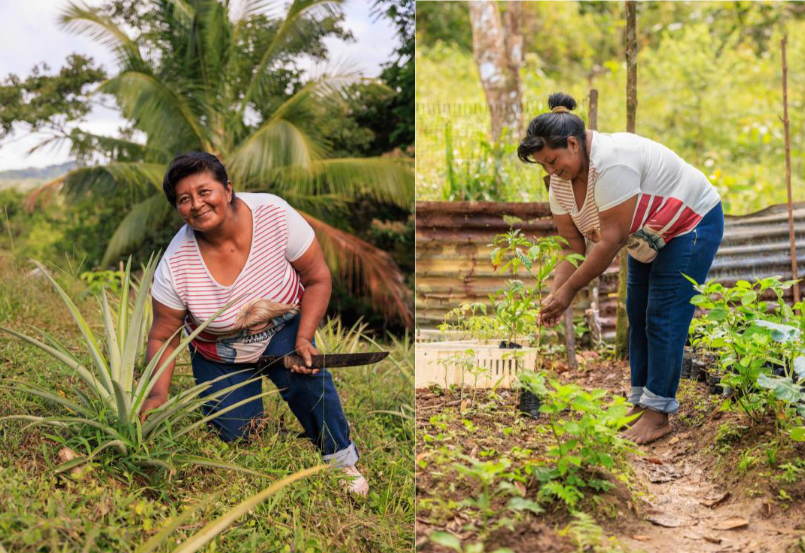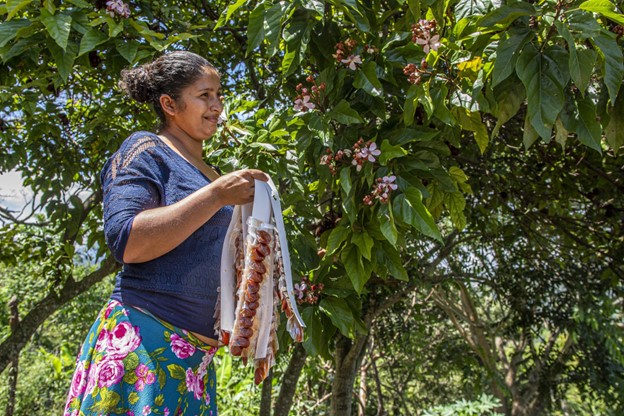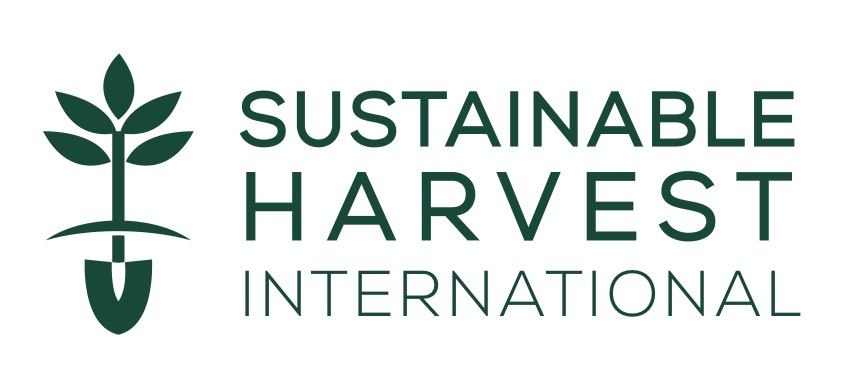Women’s Role in Sustainable Farming – Real-life examples
Starting running a farm can feel daunting, especially for rural women who lack support and resources. The uncertainty of success and the lack of education and financing prevent many rural women from starting their own farms. It’s difficult for women to change these circumstances when they lack decision-making and political power. As climate change escalates, their need for autonomy and food security becomes increasingly pressing.
At Sustainable Harvest International (SHI), we understand the challenges women rural farmers face. We work with women of all ages in Central America who strive to overcome social and cultural obstacles to provide for their families and improve their communities.

Valentina Rodríguez, SHI-Panama partner farmer, maintains her pineapple crop and prepares seedlings for reforestation.
Women farmers who work with SHI participate in training throughout all five phases of our sustainable farming program. They make decisions regarding the farm’s direction and future, including crop selection. Many of the women we work with are in charge of the household. They know what foods to grow because they cook the food. Their confidence in their expertise and commitment to nurturing their families in a healthy environment drives their passion for agriculture.

Rosa Argueta, SHI-Honduras partner farmer, shows the products she makes out of achiote in front of her achiote tree.
The Challenges for Women Face in Agriculture
Unfortunately, the expectation that women should remain primarily in domestic roles creates multiple barriers for women farmers to create and run their own businesses (and compete with the men in the sector). Resources, agricultural education, and market opportunities often favor men and are out of reach or even forbidden to women.
The challenge of obtaining financing becomes difficult due to cultural customs that disfavor women’s authority. Unequal access to land presents a significant obstacle, resulting in limited land ownership for rural women. Without land, women are unable to make their dreams a reality.
Yet, these barriers do not stop many rural women from succeeding in sustainable agriculture.

Romula Cantun, SHI-Belize partner farmer, stands proudly in front of her agroforestry parcel.
Overcoming Gender Inequality
In Central America, women farmers partnered with SHI cycle crops depending on the season, giving time for the soil to recover. Some of them expand their plots towards the end of the program, demonstrating their incredible ability to manage a farm and small family agribusiness.
One SHI-Honduras partner farmer, Ms. Isabel Montoya, practices terracing and draws level curves, which help prevent soil erosion. SHI women partner farmers readily implement sustainable practices. Their eagerness to improve both their health and their community incentivizes them to learn quickly.
Designing A Women-Led Farm
Sustainable Harvest International partner farmers learn how to plant agroforestry parcels and cultivate organic vegetable gardens. Women farmers learn how to grow a variety of crops in their backyard or on their small piece of land, maintaining biodiversity. Growing their own food allows for food security and food sovereignty. Families enjoy harvests year-round due to rotating crops, which also maintain soil fertility. Throughout the program, women learn how to prepare and apply organic fertilizers, eliminating the need for harmful chemicals that decrease soil quality.
In the tropical forests where SHI operates, ideal crops include:
- Coffee
- Plantain
- Pineapple
- Citrus fruits
- Timber trees, such as mahogany in Belize
Many women partner farmers participating in SHI’s program take pride in caring for their land. They generously share their harvests with their communities, ensuring neighbors are fed and well-nourished. Women farmers play a key role in advancing sustainable agriculture and will continue to for decades to come. Organizations, governments, and institutions can help women farmers make even more of an impact by supporting them and minimizing the barriers they face.

References
- https://www.nationalgeographic.com/culture/article/partner-content-empowering-female-farmers
- https://www.sustainableharvest.org/
Further reading
Promoting gender equality in the aquaculture industry
Women Empowerment: Bamboo Industry in Rural Areas
Improving the Farm Chicken Business Performance of Women Cooperatives in Mahdia, Tunisia
Empowering Small-Scale Farmers: Strengthening Market Access and Value Chains









































































